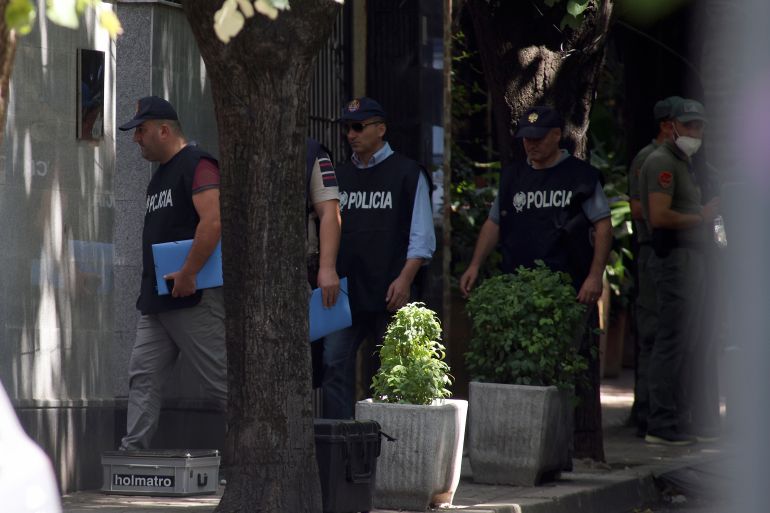How is the US involved in the Iran-Albanian political crisis?
Tehran claims Tirana has become the victim of a plot by Washington to further tarnish already-strained diplomatic relations.

Published On 10 Sep 2022
Tehran, Iran – Albania cut diplomatic relations with Iran and expelled its diplomats over a cyberattack it accused Tehran of launching, and the United States has backed the Balkan state.
Iran told Albania and the United Nations it was not involved, but a restoration of ties that were already strained because of Albania’s hosting of a group that Tehran considers to be “terrorist” appears unlikely at least in the foreseeable future.
Meanwhile, Tehran has accused Washington of fanning the flames of conflict.
Here is everything you need to know about the cyberattack and everyone involved.
How did the cyberattack affect Albania?
- The cyberattack happened on July 15, temporarily shutting down numerous Albanian government digital services and websites.
- Albanian Prime Minister Edi Rama said earlier this month the Eastern European nation determined through “undeniable evidence” it was a “state aggression” by four groups orchestrated by Iran.
- The Albanian government formally gave the Iranian embassy staff in Tirana, including diplomatic and security personnel, 24 hours to leave the country.
How did the US support Albania?
- The US government was quick to back NATO ally Albania with words and actions.
- In addition to condemning the cyberattack, Washington on Friday imposed sanctions on Iran’s intelligence ministry, in addition to intelligence minister Esmail Khatib, for what it called “malign cyber activities”.
- The sanctions are symbolic since Khatib and the ministry are not thought to hold assets in the US that can be frozen, and have no plans to conduct direct business with American citizens. Both were also sanctioned under different designations before.
- A day earlier, Washington also blacklisted several companies it accused of producing and transporting Iranian drones to Russia, which the US claims are to be used in the Ukraine war.
- This comes amid Tehran and Washington’s efforts since April 2021 to restore their 2015 nuclear deal, abandoned in 2018 by the US and followed by the imposition of all-encompassing sanctions.
How did Iran respond?
- Iran’s mission to the UN and its foreign ministry denied what it called “baseless” claims, saying Tehran has been falsely accused of mounting the cyberattack.
- In a letter to the Albanian mission and UN chief Antonio Guterres, Iran’s mission said Albanian police forcefully entered the Iranian embassy in Tirana, a move Tehran said violated international law and consular relations.
- The Iranian foreign ministry on Saturday went one step further, saying Albania has become “the victim of a scenario designed by Washington against the Islamic Republic of Iran”.
- The foreign ministry said the US has supported, and cyber-trained and equipped a “terrorist” group, which acts “as a US tool in implementing terrorist acts, cyberattacks and psychological war against the government and nation of Iran”.
Who is the ‘terrorist’ group involved?
- Iran’s claim about the US involvement relates to a group known as the Mojahedin-e Khalq (MEK), which Tehran considers a “terrorist” organisation for a string of bombings, assassinations and armed assaults on Iranian soil during the Iran-Iraq War in the 1980s.
- Iran says MEK is responsible for the deaths of 17,000 Iranians, many of them women and children, and has also blacklisted dozens of US officials for supporting the group that calls for the forceful overthrow of the current Iranian establishment.
- With US support and coordination, MEK is mainly based in Albania, in addition to several other European nations, a presence that has for years contributed to tarnished relations between Iran and the host nations.
- MEK was also designated a “terrorist” group by the US and the European Union, but was delisted more than a decade ago after renouncing violence.
Source: Al Jazeera